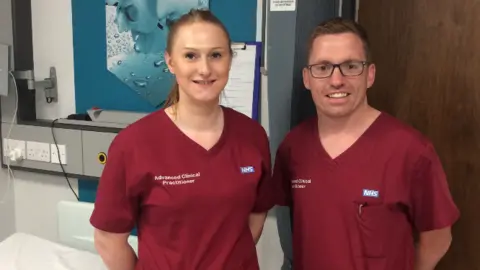Hospital trials new treatment for severe nosebleed
 Getty Images
Getty ImagesA new treatment for patients with severe nosebleeds is being rolled out at a hospital in Hull following a trial.
About 60% of people experience nose bleeds and 6% will need medical attention, according to the NHS.
Now, staff in the emergency department at Hull Royal Infirmary are giving injections of Floseal liquid to stop the bleeding, in order to help patients avoid unnecessary stays in hospital.
Philip Johnson, an advanced clinical practitioner, said: "It's a far better experience for patients as they can go home to recover instead of having an invasive and potentially uncomfortable procedure then a stay."
According to NHS Humber Health Partnership, patients of all ages can get nosebleeds, but they are more common in children, elderly people and those on blood-thinning medication.
Until now, treatments for severe nosebleeds have included invasive procedures such as cauterisation – where heat or a chemical is used to burn or destroy tissue – and nasal packing.
 NHS Humber Health Partnership
NHS Humber Health PartnershipThe new treatment was trialled by Mr Johnson and his colleague Becky Collingwood.
Floseal is applied to the nostril and hardens in order to control the bleeding. The substance then dissolves over six weeks.
A trial carried out in the emergency department between December and February found almost two thirds of patients were able to go home following the procedure.
Ms Collingwood said: "There's less discomfort for patients and, more importantly, there's no need for hospital admission."
Long hospital stays could increase the risk of infection and loss of muscle tissue, she added.
NHS Humber Health Partnership has used the results of the trial to create a formal treatment pathway that can be offered to all patients with severe nose bleeds.
According to the group, the treatment costs about one fifth of a hospital transfer and admission, meaning it saved the NHS about £10,000 over the course of the trial.
Listen to highlights from Hull and East Yorkshire on BBC Sounds, watch the latest episode of Look North or tell us about a story you think we should be covering here.
